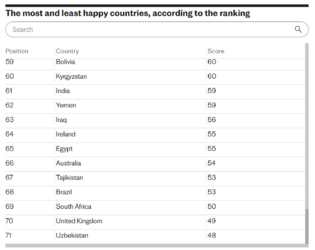Featured on Mar 9, 2024 by Null: Sapien Lab's "Mental State of the World" report ranks the United Kingdom as the 2nd most miserable country out of 72 on its list, behind only Uzbekistan.
Well, there’s always someone else worse off, right? Here’s looking at you Uzbekistan, the only nation to rank lower than the UK in a global mental wellbeing index. Yup, we’re more miserable than Moldova. Bluer than Belarus. Even Yemen and Ukraine are in better spirits, apparently. First world problems just got real.
Measuring mental wellbeing is a tricky business. But the US non-profit, Sapien Labs, has had a go with its Mental State of the World report, the latest edition of which has just landed. Using data from 500,000 respondents in 71 countries, it measures how people’s “inner state impacts their ability to function within their life context”. In other words, mental wellbeing relative to the setting.
The results suggest that despite living through an unfolding humanitarian disaster, Yemenis are functioning better in relative terms than not only Brits, but the Aussies and Irish, too.
Right. Forgive us for not relocating to downtown Sana’a just yet. Rich Western nations performed poorly overall, with researchers noting: “Greater wealth and economic development do not necessarily lead to greater mental wellbeing.”

Are things really that bad in Blighty? Is our stiff upper lip truly all a-quiver? The similarly dubious but slightly woollier World Happiness Report doesn’t think so. It ranks the UK 19th in its cheeriest nations index, between the Czech Republic and Lithuania. Still, you’d require weapons-grade patriotism to survey our land and conclude that all is well. The Office for National Statistics recorded an overall decline in personal wellbeing across the UK in 2023. Meanwhile, the charity Mind warns of an unfolding mental health crisis, particularly among men and young people.
Little wonder, then, that wellness retreats are booming. I went on one last year in Cornwall, run by the ex-rugby pro Anthony Mullally. Mullally’s not your archetypal wellness guru. He doesn’t drink kale or hug you for too long. In fact, he’s 6ft 5, with a Scouse twang, bulging biceps, long ginger hair and the look of a man whose ancestors arrived in England on a longboat.
His retreats aim to equip the kind of men who are congenitally suspicious of kale with the techniques they need to “stay steady in a chaotic world”. I must say, it’s kept me calmer.
But stresses abound. Money is tight. The health system is creaking. The sea is full of poo. Our Hogarthian town centres, with their boarded-up shops and rough sleepers, are yet further signs of a struggling nation.
“We have to find a new identity,” one Ilkeston resident told me recently in the down-at-heel Derbyshire town. It was once an engine room of the Industrial Revolution but is now best known for its cash point – currently the top-rated attraction on TripAdvisor. “Typical of Ilkeston humour,” another local told me. I suppose it’s reassuring that Britain’s sense of mischief limps on.
Where, you might ask, did it go wrong? Pick your villain. Covid. Putin. Brexit. The wokerati. Austerity. Bojo. Ulez. The lettuce prime minister. The anti-growth coalition. Blair. The internet. Hmmm. The internet.
Adding to a growing body of evidence, Sapien Labs identifies a link – not just in the UK, but globally – between poor mental wellbeing and the pervasiveness of smartphones and online comms. That young people are noted to have suffered the biggest drop in mental wellbeing appears to add heft to their argument. Ditto the fact that lower-tech countries, such as Sri Lanka and Tanzania, are among those recording better wellbeing scores. Stronger family ties in those nations were also linked to better mental health.
The internet has a lot to answer for, then. It has, of course, facilitated the home-working phenomenon that hushed our cities post-Covid. It sent dating and retail online, fanned the culture wars, and distracted us, research shows, from having sex. No wonder we’re glum. Has it also robbed us of a soundtrack for these weird times? In the moribund early nineties, there was at least a musical movement to lift the nation. Scant chance of a unifying Britpop 2.0 in the streaming age, with its fragmented, fickle audiences. No wonder we’re in the midst of misty-eyed 1990s nostalgia – when mullets are back, you know you’re in trouble.
“Everything’s online now, the shops have closed.” It’s a lament I’ve heard repeatedly on my travels across the land for this newspaper. Our sense of place, it seems, has gone. We are adrift in the digital ether. Lost and lonely in our screens. Barraged by bad news.
Perhaps that’s too convenient a narrative. Like the Mental State of the World report, it tells only part of the story. Another narrative is of resilient communities across the UK, which, like Ilkeston, have stepped up to start newspapers where theirs have folded, grow food in communal spaces, and even take over post offices.
They have united, too, to save our cherished pubs, bringing these community hubs into the hands of the people who use them. The UK has lost six per cent of its pubs in the last six years – reason enough to be glum – according to the British Beer & Pub Association. In that same period the number of community-owned pubs has soared by 63 per cent. My local, the Ivy House in Nunhead, a lynchpin of our neighbourhood, was London’s first, but not its last. Even Britain’s most remote village, Inverie, has dug deep enough to save its local, The Old Forge, which is reached only by hiking 17 miles or taking a ferry.
